Why Pep Guardiola’s Manchester City needed to lose before they couldn’t stop winning
Pep Guardiola is the winner who was running through his defeats. He brought them up: Monaco and Liverpool and Tottenham, the Champions League exits. He could do it from a position of strength, as the reigning champion, as the man who took Manchester City into uncharted territory.
Not just the final, either. As Guardiola noted, he joined a club with precious little Champions League pedigree. Now they have reached the quarter-finals seven times in a row. It is the longest current streak, the joint third longest ever, bettered only by Real Madrid and Barcelona, whose record run of 13 included four campaigns under Guardiola and which may be threatened by his current club. And if that is a product in part of the competition’s changing format, and the way participation is not restricted to the domestic champions, City may note that they have equalled Manchester United’s longest run to the last eight, set more than two decades ago.
The outsiders have become the ever-presents. Guardiola argues they are not yet part of the establishment – perhaps they never will be, should an eventual Premier League punishment when their 115 charges result in ejection from Europe in future seasons – but for now they are holders and favourites. Guardiola has transformed City’s status: in their own minds, as well as in everyone else’s. He has done so, he said, from a less advantageous position compared to his old employers. He has stripped City of their inferiority complex.
“I felt the people when we arrived from a club like Barcelona and Bayern Munich what they demand is to always be there and I felt the club, not the players, didn’t feel it,” he said.
And if Manuel Pellegrini may remember steering City to the semi-final a few months before Guardiola arrived, and if the Catalan’s first campaign was curtailed in the last 16, Roberto Mancini had twin group-stage exits and Pellegrini two losses in the first knockout stage. There was a time when City had the money and the ambition but a capacity to exit Europe long before the traditional powers.
“It is easy for clubs that have big history – start with the best ones: Real Madrid, Barcelona, Liverpool, Bayern Munich or Man United – who have been used to it. It was not [that I] come here, one person from Catalonia says now we are going to win the Champions League, it is not about that. You need time and they gave me time. Now we are a process where we can lose, definitely, but we can compete everywhere because come from the final, semi-final, final, now the quarter-finals again. That means our consistency in Europe.”

Consistency can seem the least glamorous of achievements, lacking the element of the new and exciting, turning the familiar into the formulaic. But City have had stability behind the scenes and consistency of thought. Guardiola has long claimed that City could have sacked him: having waited to hire him, having brought in his allies Ferran Soriano and Txiki Begiristain to help attract and support him, he may be alone in that belief.
But he added: “We are here because we need time and people, managers don’t get time. Hierarchies don’t get time. But they gave us time to lose against Monaco, lose against Liverpool, lose against Tottenham, all the process to do it because when a team comes from never ever being in that position, you cannot do it.”
Now City seem always in that position. “People take it for granted now,” Guardiola added. “It’s good but internally, we know it’s difficult. This is what I want my club to feel, from the hierarchy, the people working here, the players: that everything is complicated.”
Some may demur. Perhaps beating FC Copenhagen 3-1 on the night, 6-2 on aggregate, a club with a lower budget than anyone in the Premier League, was not the time to argue: “This competition is so tricky, so dangerous.” This felt a game devoid of danger and his assertion that he exclaimed “wow” every time City qualify from the group stages should be placed in the context of smooth progress from distinctly winnable pools.
The bullish declaration came not from Guardiola, but from the beaten manager. “They are going to win it,” said FC Copenhagen’s Jacob Neestrup. He arrowed in on the secrets of potential success, explaining: “They work f***ing hard.”
But knockout ties come with an inherent peril. It is a reason why City were long described as the best team in Europe before they had the silverware, because they could lose over 90 or 180 or 210 minutes, on away goals or cloaked in controversy. City could make reaching the last eight look simple and everything complicated thereafter.

 Yahoo Sport
Yahoo Sport 



































































